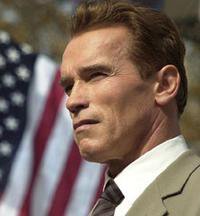onsdag, november 16, 2005
onsdag, november 09, 2005
morning in california
 Governor Schwarzenegger’s agenda has been terminated. Sorry, but I couldn’t resist that oh-so-obvious lead-in. Thanks in no small part to a massive grassroots mobilization led by the labor movement, every one of the Governor’s propositions on yesterday’s ballot went down to defeat. Also defeated were two progressive initiatives aimed at curbing prescription drug costs and bringing the energy industry back under State oversight. I’ll have more analysis of this later, after my head clears from the frenzy of election day.
Governor Schwarzenegger’s agenda has been terminated. Sorry, but I couldn’t resist that oh-so-obvious lead-in. Thanks in no small part to a massive grassroots mobilization led by the labor movement, every one of the Governor’s propositions on yesterday’s ballot went down to defeat. Also defeated were two progressive initiatives aimed at curbing prescription drug costs and bringing the energy industry back under State oversight. I’ll have more analysis of this later, after my head clears from the frenzy of election day. In
This is reason to celebrate beyond
Our city council race went well overall, with all of the Democratic Party endorsed candidates winning election or re-election. All local elections in
fredag, november 04, 2005
countdown.
 Californians, well, some Californians, head to the ballot box on Tuesday to vote on eight highly contested propositions. The election is, by all accounts, a referendum on our ridiculous boy-Governor
Californians, well, some Californians, head to the ballot box on Tuesday to vote on eight highly contested propositions. The election is, by all accounts, a referendum on our ridiculous boy-Governor A massive, labor-led coalition has assembled to defeat the anti-union and budgetary initiatives, while pro-choice groups have forged a coalition to turn back the parental notification prop. Recent polls have the anti-union initiatives trailing significantly, but are mixed on the abortion measure. I’m scared about all of them.
This election is a good example of what is wrong with Californian democracy. Not only is this a special election, called by the Governor to ram through his agenda during what he hopes will be a low-turnout election cycle, but it reveals just how bankrupt governance-by-iniative really is.
In 2004, 990,000 voters left the box blank for proposition 72, which would have provided healthcare for millions of Californians. The proposition failed by 160,000 votes. It would be easy to blame voter apathy or ignorance. However, it is understandable that voters feel uneasy about casting a ballot on highly technical questions, especially when they are bombarded with 24-hour television commercials reducing these questions down to soundbites and theme music. In the absence of real campaign finance reform, real debate on our public airwaves, and effective voter education on issues, referenda are decided in much the same way as our candidate elections are: he who spends the most, wins.
It is possible to give substantive issues to the voters to make choices on. But when the Governor holds invitation-only “town hall” meetings made up of supporters in order to “disucuss” his proposals, we all lose.
So, I’ll be spending much of this weekend and Monday and Tuesday knocking on my neighbors’ doors and calling people on the phone in order to get as many of the Democrat-leaning Californian base to the polls on Election Day. There is a hell of a lot at stake. Proposition 73, the anti-choice measure, looks like it could pass. If so, the Constitution of the great State of
No sleep till Tuesday.
the most successful society the world has ever known
 Maybe its because I am nervous that California will put the axe to unions and take huge a step backward on women's rights in next Tuesday's election, but I've been cheering myself up by trying to follow social democratic politics in Europe. Here is a great article in UK's Guardian Online about Sweden. Well worth a read. Here's also a nice summary and response on Peter Gustavsson's great blog.
Maybe its because I am nervous that California will put the axe to unions and take huge a step backward on women's rights in next Tuesday's election, but I've been cheering myself up by trying to follow social democratic politics in Europe. Here is a great article in UK's Guardian Online about Sweden. Well worth a read. Here's also a nice summary and response on Peter Gustavsson's great blog.I hate to contribute to the myth that our friends in Europe have solved all their problems, or that, somehow, Europeans are just better than Americans. They aren't. You'll find much of the same small-mindedness, xenophobia and selfishness over there as over here. What you will also find, however, is a political culture which was transformed by a powerful and innovative labor movement. Toynbee's article in the Guardain undermphasizes this.
While cultural differences are important, I've always held that the major differences between Europe and the United States in terms of political culture are historical and political. Some of them rise to the level of structure: the lack of feudal past, the legacy of slavery and white supremacy, the long period of expansion into the west, etc. However, all politics is about confronting structure with agency- adapting to the conditions presented to you and willfully pursuing a course of action. Politics, indeed, is to want something.
We can build a successful society here in the United States. Our historically vibrant social movements have long been inspirational to those struggling in the rest of the world. Olaf Palme, one of the architects of Swedish social democracy, was profoundly inspired by the time he spent in the United States, and considered himself a student of civil rights insurgencies here. We, too can be inspired by the successes, however under attack and in retreat, of our friends in colder climes, but we must never forget that our own path will be different. Most importantly, actually existing social democracy is an argument that there are different ways to organize society. So often, our opponents on the right seem to convince us that their way is the only way available. A better world is possible. However, an American "successful society" will be distinctly American.
Let us continue.








